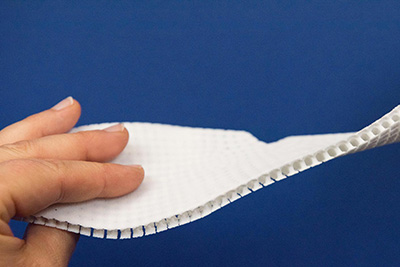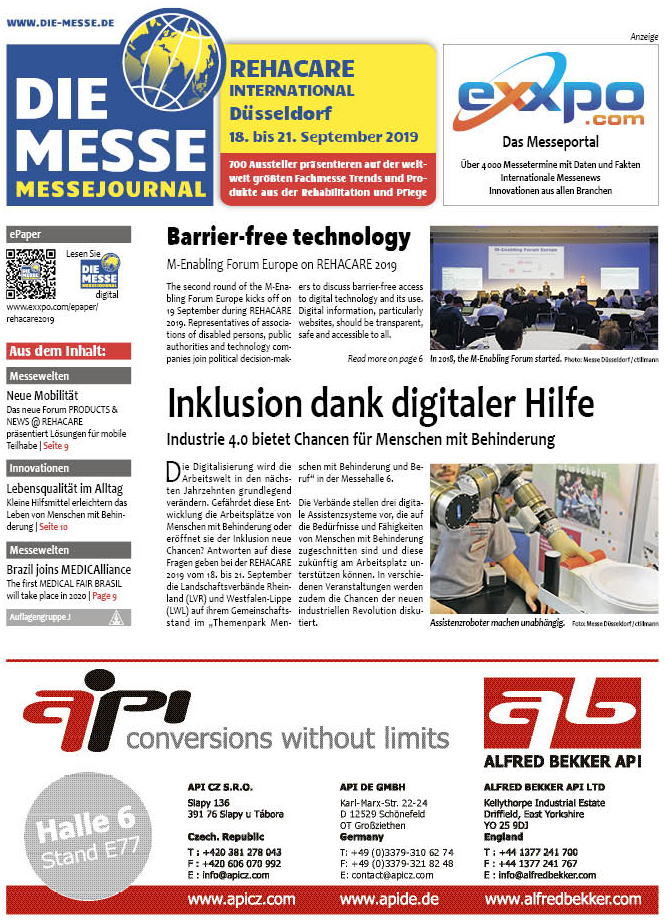2 October 2017
Is your shoe too tight? Normally you would just shift your weight to take the pressure off the area that is sore. In people with diabetes, however, the nerve endings in the foot often become atrophied, and those affected cannot feel the soreness. This can give rise to pressure points and eventually wounds that heal badly. A remedy, or at least some relief, is promised by insoles that are very soft in the area of the injury, and that are custom-made by orthopedic shoemakers in a variety of materials. Up until now, however, it has not really been possible to assess the success of insoles scientifically – each insole is a one-off item, after all. So it is in the interests of health insurances companies to have the process surrounding insoles digitalized to allow the collection of scientific data on them.
It will soon be possible to digitalize the manufacture of insoles. LAUF, a German acronym for “laser-assisted construction of customized footwear”, refers to a project funded by Germany’s Federal Ministry of Education and Research. Researchers from the Fraunhofer Institutes for Mechanics of Materials IWM and for Environmental, Safety, and Energy Technology UMSICHT are collaborating with industry partners on the process of digitalization. “Digital foot mapping is already common practice. As part of this project, we have now also completely digitalized the insole production process,” says IWM scientist Dr. Tobias Ziegler. “Using newly developed software, the orthopedic shoemaker can design an insole for an individual patient and can print out the result on a 3D printer.” The advantages: on the one hand, the mechanical properties of each insole become readily apparent, which is something health insurance companies want. On the other, insoles can be produced at greatly reduced cost.
Two companies laid the foundations for the 3D printing of insoles some years ago. These industry partners were the first to develop a soft material for 3D printing in the form of thermoplastic polyurethane (TPU). Working together with UMSICHT experts, they are now developing other types of TPU that are expected to be even more suitable for use in orthopedic insoles. IWM scientists have meanwhile been optimizing the three-dimensional structures that are required of TPU when it is used for insoles. How soft or rigid insoles are depends not just on the material itself, but also on how it is shaped. “First we think about structures – straight rods, crooked arms, or triangles, for instance – then we produce a computer model of them, key in the data for a particular material, and simulate how rigid the result is under pressure,” Ziegler explains. “Where does an insole need to be soft, or more rigid? By altering the structure type, we can precisely determine the rigidity of the insole.”
Do-it-yourself insoles
In the past, insoles for patients with diabetes were hand-made by orthopedic shoemakers. In the future, these specialist shoemakers will be able to produce insoles more cost-effectively thanks to new software and the use of 3D printers. This approach means the mechanical properties of each insole can be assessed scientifically and more effectively.
 Photo: Fraunhofer IWM Photo: Fraunhofer IWMWith a combination of different structures in an insole, localized rigidity is digitally adjustable. |
It will soon be possible to digitalize the manufacture of insoles. LAUF, a German acronym for “laser-assisted construction of customized footwear”, refers to a project funded by Germany’s Federal Ministry of Education and Research. Researchers from the Fraunhofer Institutes for Mechanics of Materials IWM and for Environmental, Safety, and Energy Technology UMSICHT are collaborating with industry partners on the process of digitalization. “Digital foot mapping is already common practice. As part of this project, we have now also completely digitalized the insole production process,” says IWM scientist Dr. Tobias Ziegler. “Using newly developed software, the orthopedic shoemaker can design an insole for an individual patient and can print out the result on a 3D printer.” The advantages: on the one hand, the mechanical properties of each insole become readily apparent, which is something health insurance companies want. On the other, insoles can be produced at greatly reduced cost.
Two companies laid the foundations for the 3D printing of insoles some years ago. These industry partners were the first to develop a soft material for 3D printing in the form of thermoplastic polyurethane (TPU). Working together with UMSICHT experts, they are now developing other types of TPU that are expected to be even more suitable for use in orthopedic insoles. IWM scientists have meanwhile been optimizing the three-dimensional structures that are required of TPU when it is used for insoles. How soft or rigid insoles are depends not just on the material itself, but also on how it is shaped. “First we think about structures – straight rods, crooked arms, or triangles, for instance – then we produce a computer model of them, key in the data for a particular material, and simulate how rigid the result is under pressure,” Ziegler explains. “Where does an insole need to be soft, or more rigid? By altering the structure type, we can precisely determine the rigidity of the insole.”
More news about "Rehacare":
19 October 2018
Rehacare: Mobility for people with disabilities
Innovations focusing on rehabilitation and care ensured that the halls were full at Rehacare 2018 in Düsseldorf, which came to a close on September 29. Around 50,600 visitors gained new information from nearly 1000 exhibitors from 42 countries. (more…)1 November 2017
Rehacare 2017: Independent living in focus
Mobility and home care were top topics at the Rehacare International 2017 in Düsseldorf, where about 39,000 visitors gained information on the specialist trade fair and conference on support and knowledge on independent living. (more…)16 October 2016
Full exhibition halls in Düsseldorf: A total of 49,300 industry professionals and people affected by disabilities visited Rehacare, the market for opportunities for self-determined living. (more…)
| FAIR NAVIGATOR PHARMA / MEDICAL TECHNOLOGY | |
|---|---|
|
| E-PAPER REHACARE |
 |
